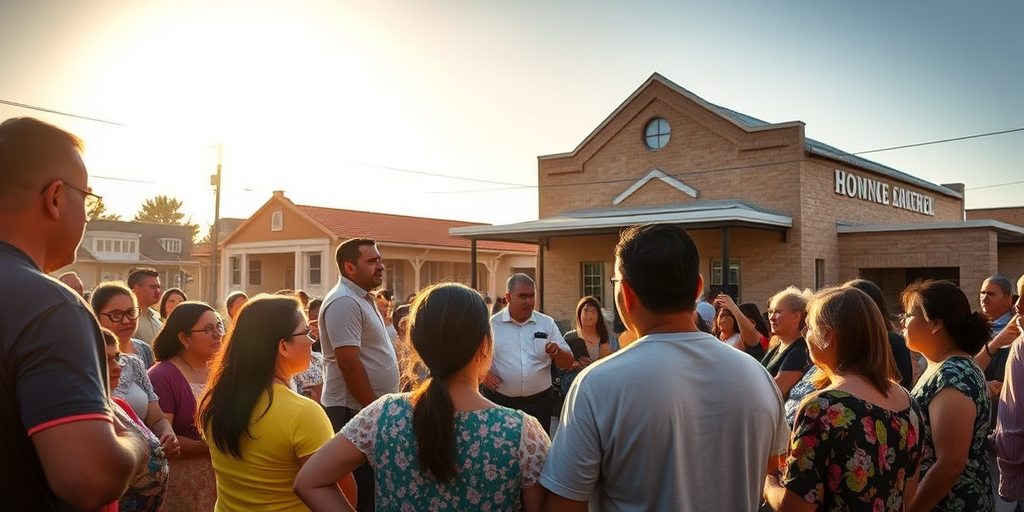Brownsville Daycare Worker Back in ICE Custody Amid Child Death Investigation
The recent development in the contentious case involving a Brownsville daycare worker has captured significant RGV news attention as local residents grapple with its potential implications. Karen Silva, accused of involvement in the tragic death of a 4-year-old boy in a daycare incident, is back in U.S. Immigration and Customs Enforcement (ICE) custody. The community weighs in as Silva’s legal journey takes another turn, touching on broader issues of immigration and daycare safety in the Rio Grande Valley.
The Incident and Legal Proceedings
The case dates back to a harrowing day when Logan Urbina, a four-year-old boy, was found unresponsive in a daycare van, reportedly left alone for nearly five hours following a field trip. Silva, alongside another employee, was implicated in the case, which has spurred discussions about childcare vigilance and responsibility in the Valley. Initially, Silva was taken into state custody but was later transferred back to ICE custody after a hearing held at the Carrizales Rucker Detention Center.
Silva’s defense team is focused on moving her from state custody to ICE, with the aim of seeking her release on bond while awaiting trial. According to her attorney Louis Sorola, Silva has not been formally charged in connection with Urbina’s demise, a fact pivotal to her legal strategy. Last month, an attempt to dismiss the case was denied, leaving Silva’s future uncertain amid ongoing legal and immigration proceedings.
Impact on the Local Community
The case has resonated deeply with Valley residents, many of whom rely on childcare services amidst their daily work routines. Concerns about daycare safety standards have surfaced across South Texas, prompting calls for stricter regulations and enforcement.
Maria Sanchez, a Brownsville mother, expressed worry. “As a working parent, you want to be sure your kids are safe in these environments. What happened to Logan is every parent’s worst nightmare, and it’s a wake-up call for all of us. We need proper systems in place to prevent this from happening again,” she said.
Legal and Immigration Implications
Silva’s personal circumstances complicate the legal narrative further. Having entered the United States on a non-immigrant visitor visa, Silva overstayed her permission, adding to her current predicament. Her application for asylum is still under review, which brings additional layers to an already complex legal battle.
This aspect highlights the intersecting issues of immigration policy and legal processes, magnified under prosecutorial and public scrutiny. The Rio Grande Valley, noted for its diverse population and proximity to the U.S.-Mexico border, frequently sees such cases that intertwine legal, social, and immigration considerations.
Community Reactions and Concerns
In Brownsville, discussions around the appropriateness of Silva’s custody situation have also unfolded. The shift back to ICE custody after state detainment raises questions within the community about due process and humane treatment, especially in cases where formal charges remain pending.
“Everyone deserves fair treatment under the law,” noted Vicente Gonzalez, a local community advocate. “While there are serious accusations here, we must navigate this case without pre-judging individuals based on immigration status. The focus should remain on justice for the child and understanding all dimensions of the situation.”
Future Outlook and Considerations
Looking ahead, the implications of this case could extend beyond immediate legal outcomes. For the RGV community, it presents an opportunity to strengthen conversations around childcare regulations and immigrant rights within legal frameworks. Increased public discourse may spur local policymakers to enhance safety protocols and resources for daycare facilities, ensuring comprehensive vigilance and protection for the Valley’s youngest residents.
The broader systemic lessons drawn from these incidents could influence policymaking on childcare and immigration to address the inherent challenges of such multifaceted cases. The community remains engaged as they anticipate further developments, hoping for a resolution that prioritizes child safety and underscores justice priorities.
As legal proceedings continue, Valley residents are encouraged to stay informed and connected through local resources such as the KRGV news network and community forums. The outcome of this case could set benchmarks for similar incidents, reinforcing a community-based approach that reflects shared responsibility and mutual care.
In conclusion, the path forward involves both acknowledging the tragedy and addressing larger systemic frameworks to prevent recurrence. As RGV focuses on the interplay of justice, safety, and immigration, this case serves as a poignant reminder of the responsibilities borne by all sectors of society.







